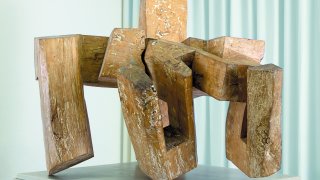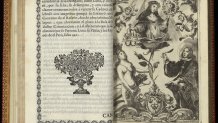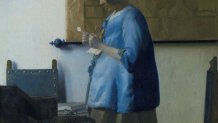
During its 2022-2023 season, the Meadows Museum at Southern Methodist University brings the world to Dallas.
Four exhibitions will showcase global treasures, focusing on portraiture, holy women in Spain, a side-by-side display of works by Salvador Dali and Johannes Vermeer, and the major works of Spanish abstraction from the 1960s to 1980. The exhibition combines loans from around the world with works from the museum’s collection. The season begins with Masterpiece in Residence: Velázquez’s King Philip IV of Spain from The Frick Collection in September.
“We look forward to this extraordinary program of international loan exhibitions and the opportunity to view masterpieces by Velázquez, Dalí, Vermeer, as well as Tàpies, Saura, and more within the context of the Meadows Museum’s exceptional collection of Spanish art. During the 2022–2023 exhibition season, visitors are invited to enjoy art of the highest caliber from a range of chronological periods in a new light,” said the museum’s Director ad interim and Curator, Amanda W. Dotseth. “Each exhibition brings something never seen before to North Texas and to the visitors of the Meadows Museum.”
See full exhibition schedule below:
Masterpiece in Residence: Velázquez’s King Philip IV of Spain from The Frick Collection
Sept. 18, 2022 through Jan. 15, 2023
The portrait King Philip IV of Spain (1644), by the Spanish court painter Diego Rodríguez de Silva y Velázquez, will travel from The Frick Collection in New York City to the Meadows Museum as part of the ongoing loan program titled Masterpiece in Residence and organized by the Meadows, featuring some of the most important works of Spanish art in U.S. collections.
Get top local stories in DFW delivered to you every morning. >Sign up for NBC DFW's News Headlines newsletter.
Beginning September 18, 2022, the portrait will be displayed with Meadows Museum’s own three paintings by this influential artist. The Meadows’s bust-length Portrait of King Philip IV (c. 1623–24), likely Velázquez’s first portrait of his king and patron, will be joined by The Frick’s 1644 portrait, which is considered among the most important Spanish paintings in an American collection.

The differences in execution between the two portraits painted just over two decades apart highlight the evolution of Velázquez’s technique and his mastery of looser, more fluid brushwork, which demonstrates the impact of his study of Venetian masters, both in the Spanish royal collections and in Italy, as he developed a style all his own. The Meadows’s Portrait of Queen Mariana (c. 1656) and Female Figure (Sibyl with Tabula Rasa) (c. 1648), offer further evidence of his artistic growth over his career and will be installed in the same gallery as the two portraits of the king.
This exhibition has been organized by the Meadows Museum and is funded by a generous gift from The Meadows Foundation.
Picturing Holy Women in the Spanish Empire, 1620–1800
Sept. 18, 2022 through Jan. 15, 2023
Picturing Holy Women in the Spanish Empire, 1620–1800 will be the first exhibition organized by the Meadows Museum to explore the momentous and varied roles that female biblical figures, saints, and monastics played in early modern Spain and its empire. The exhibition relies on images of influential holy women to explore the complex history of how the Catholic Church and Spanish monarchy sought to control women’s movement in public and, ultimately, to separate them from the outside world.

Drawings, prints, and rare books offer insight into the special role of images in the promotion of idealized models of female piety while also revealing that, despite the patriarchal society in which they lived, some women became active spiritual leaders, authors, and patrons. Visual representations of the Virgin Mary, Mary Magdalene, Saint Teresa of Ávila, and Saint Rosa of Lima, among others, will be featured.
Largely drawn from the collection of SMU’s Bridwell Library, the exhibition is curated by the Meadows Museum’s Center for Spain in America (CSA) Curatorial Fellow, Miranda Saylor. Highlights include an extraordinary engraving representing Saint Teresa preaching (1679), a frontispiece featuring the Mexican nun Sor Sebastiana Josefa de la Santísima Trinidad (1765), and a rare 18th-century pictorial manuscript commissioned for the Convent of Santa Clara in Palma de Mallorca (c. 1780–1800). These will be joined by works from the Meadows’s collection, as well as loans from SMU’s DeGolyer Library and a private collection.
This exhibition has been organized by the Meadows Museum and is funded by a generous gift from The Meadows Foundation.
Local
The latest news from around North Texas.
Dalí/Vermeer: A Dialogue
Oct. 16, 2022 through Jan. 15, 2023
Spanish Surrealist artist Salvador Dalí’s appreciation for the 17th-century Dutch master Johannes Vermeer will be explored in the exhibition Dalí/Vermeer: A Dialogue, opening October 16, 2022. In 2016, the Meadows exhibition catalogue Dalí: Poetics of the Small, 1929–1936 shed new light on Dalí’s long obsession with Vermeer’s work.
This new exhibition brings together two paintings for the first time: Vermeer’s Woman Reading a Letter (c. 1663), from the Rijksmuseum in the Netherlands, and Dalí’s The Image Disappears (1938), his Surrealist transformation of Vermeer’s composition, from the Fundacio Gala-Salvador Dali, in Figueres, Spain, who displays the painting in the Teatro-Museo Dalí. Thanks to a side-by-side display of the two paintings, this focused exhibition offers the extraordinarily rare opportunity to see work by these two artists together and trace the ways Dalí infused his own unique artistic vision with themes and techniques borrowed from the Dutch painter. A selection of Dalí’s prints from the Meadows Museum’s permanent collection will also be featured in the galleries.
This exhibition has been organized by the Meadows Museum and is funded by a generous gift from The Meadows Foundation.

In the Shadow of Dictatorship: Creating the Museum of Spanish Abstract Art
Feb. 26 through June 18, 2023
In spring 2023, the Meadows Museum will host a comprehensive selection of Spanish abstract painting and sculpture by globally recognized artists including Eduardo Chillida, Antonio Saura, and Antoni Tàpies, alongside twenty-nine of their Spanish contemporaries active in the 1960s and 1970s, such as Luis Feito, Sarah Grilo, and José Guerrero.
The exhibition, traveling from the collection of the Museo de Arte Abstracto Español while its building undergoes renovation, will make its only stop in the United States in Dallas. Curated by the Meadows’s Mellon Curatorial Fellow Clarisse Fava-Piz, the exhibition will feature more than forty works of art by over thirty artists in an unprecedented stateside showing of the Museo de Arte Abstracto Español’s collection. For many works, this exhibition represents their first time leaving their home in Cuenca, Spain, and their debut in the United States.
The collection showcases the great diversity of Spanish abstraction, from Informalism to geometric abstract art, the history of which will be explored in the accompanying catalogue. Other topics covered will be the creation of the Museo de Arte Abstracto Español in Cuenca under the Francoist dictature; the background of its eccentric founder, artist and collector Fernando Zóbel; the development of Spanish abstract art in both Fascist Spain and in the international context of the Cold War; and the strategic exhibition of Spanish abstraction in the United States, 1950–1975.
This exhibition has been organized by the Meadows Museum and Fundación Juan March, and is funded by a generous gift from The Meadows Foundation.
Learn more: Meadows Museum



